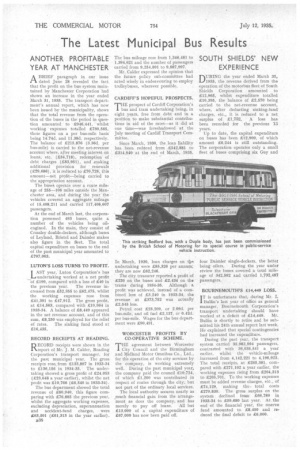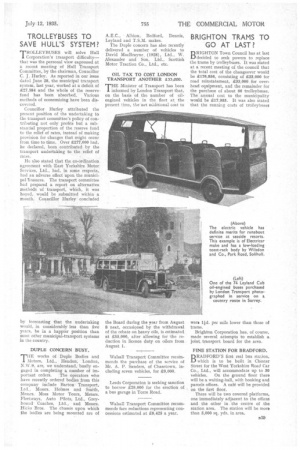The Latest Municipal Bus Results
Page 52

Page 53

If you've noticed an error in this article please click here to report it so we can fix it.
ANOTHER PROFITABLE YEAR AT MANCHESTER
ABRIEF paragraph in our issue dated June 28 revealed the fact that the profit on the bus system maintained by Manchester Corporation had shown. an increase in the year ended March 31, 1935. The transport department's annual report, which has now been issued by the municipality, shows that the total revenue from the operation of the buses in the period in question amounted to £946,441, whilst working expenses totalled £730,565, these figures on a per bus-mile basis being 14:74d. and 11.38d. respectively. The balance of £215,876 (3.36d. per bus-mile) is carried to the net-revenue account where, after meeting interest on loans, etc. (£34,718), redemption of debt charges (£83,951), and -making additional provision for • renewals (£'29,686), it is reduced to £70,728, this amount-net profit-being carried to
the appropriation account. '
The buses operate over a route mileage of 255-106 miles outside the Manchester area, and during the year the vehicles covered an aggregate mileage of 15,408,211 and carried 117,408,607 passengers.
At the end of March last, the corporation possessed 493 buses, quite a number of the vehicles being oilengined. In the main, they consist of Crossley double-deckers, although buses of Leyland, Bristol and Daimler makes also figure in the fleet. The total capital expenditure on buses to the end of the past municipal year amounted to £797,063.
LUTON'S LOSS TURNS TO PROFIT.
LAST year, Luton Corporation's bus 1...undertaking worked at a net profit of £199, compared with a loss of £40 in the previous year. The revenue increased from £52,355 to £62,475, whilst the working expenses rose from £41,391 to £47,912. The gross profit, at £14,563, compared with £10,964 in 1933-34. A balance of £8,449 appeared in the net revenue account, and of this sum, £8,250 was employed for the relief of rates. The sinking fund stood at £16,435.
RECORD RECEIPTS AT READING.
RECORD receipts were shown in the report of Mr. J. M. Calder, Reading Corporation's transport manager, for the past municipal year. The gross receipts roses from £133,897 in 1933-34 to £136,156 in 1934-35. The undertaking showed a gross profit of £24,053 (£23,648 a year earlier), whilst the net profit was £10,766 (£6,540 in 1933-34).
The bus department showed the total revenue of £80,940, this figure comparing with £76,885 the previous year, whilst the aggregate working expenses, excluding depreciation, superannuation and accident-fund charges, were £63,501 (£61,313 in the year earlier).
B38 The bus mileage rose from 1,346,481 to 1,394,621 and the number of passengers carried from 9,254,801 to 9,887,997.
Mr. Calder expressed the opinion that the future policy sub-committee had acted wisely in endeavouring to employ trolleybuses, wherever possible.
CARDIFF'S HOPEFUL PROSPECTS.
-THE prospect of Cardiff Corporation's .I. bus and tram undertaking being, in eight years, free from debt and in a. position to make substantial contributions in aid of the rates-as it did at one time-was foreshadowed at the July meeting of Cardiff Transport Committee.
Since March, 1330, the loan liability has been redaced from £542,881 to £314,940 at the end of March, 1935.
In March, 1930, loan charges on the undertaking were £85,326 per annum; they are now £62,246.
The city treasurer reported a profit of £220 on the buses and £2,434 on the trams during 1934-35. Although a profit was achieved, instead of a combined loss of £3,240 in 1933-34, the revenue at £373,752 was actually £2,545 less.
Petrol cost £23,209, or 2.09d. per bus-mile, and oil fuel £2,137, or 0.42d. per bus-mile. Wages for the bus department were £90,491.
WORCESTER PROFITS BY CO-OPERATIVE SCHEME.
T"agreement between Worcester City Council and the Birmingham and Midlaad Motor Omnibus Co., Ltd., for tle operation of ths city services by the comoany, is working extremely well. During the past municipal year, the company paid the council £10,724, of which £1,200 was contributed in respect of routes through the city, but not part of the ordinary local services.
The local authority secures nearly as zmuch financial gain from the arrangement as does the company, and has merely to pay off loans. All but £13,000 of a capital expenditure of £67,000 has now been paid off.
SOUTH SHIELDS' NEW EXPERIENCE
DtRING the year ended March 31, 1935, the revenue derived from the operation of the motorbus fleet of South
• Shields Corporation amounted to £12,965, whilst expenditure totalled £10,395, the balance of 42,570 being carried to the net-revenue account, where, after deducting sinking-fund charges, etc., it is reduced to a net surplus of :£1,752. A loss has been recorded for the previous 13 years.
Up to date, the capital expenditure on buses has been £12,900, of which amount £6,244 is still outstanding. The corporation operates only a small fleet of buses comprising six Guy and four Daimler single-deckers, the latter
being oilers. During the year under review the buses covered a total mileage of 342,592 and carried 1,732,487 passengers.
BOURNEMOUTH'S £14,449 LOSS.
I T is unfortunate that, during Mr. I. Bulfm's last year of office as general manager, Bournemouth Corporation's transport undertaking should have
worked at a deficit of £14,449. Mr. Bulfin is shortly to retire and he subMitted his 24th annual report last week. He explained that special contingencies had increased the expenditure.
During the past year, the transport system carried 35,983,994 passengers, contrasted with 36,035,541 a year earlier, whilst the vehicle-mileage increased from 4,142,221 to 4,196,923. The total receipts, at £265,381, compared with £271,102 a year earlier, the working expenses rising from £204,313 to 4205,701. To the working expenses must be added revenue charges, etc„ of £74,129, making the. total costs £279,830. The gross surplus on the system declined from £66,789 in 1933-34 to £59,680 last year. At the end of the financial year, the reserve fund amounted to £8,450 and reduced the final deficit to £6,000.
TROLLEYBUSES TO SAVE HULL'S SYSTEM?
TROLLEYBUSES will solve Hull Corporation's transport difficulty— that was the personal view expressed at a recent meeting of Hull Transport Committee, by the chairman, Councillor C. J. Hurley. As reported in our issue dated June 28, the municipal transport system, last year, worked at a deficit of £27,584 and the whole of the reserve fund has been absorbed. Various methods of economizing have been discovered.
Councillor Hurley attributed the present position of the undertaking to the transport committee's policy of contributing not only profits but a substantial proportion of the reserve fund to the relief of rates, instead of making provision for changes that might occur from time to time. Over £277,000 had, he declared, been contributed by the transport undertaking to the relief of rates.
He also stated that the co-ordination, agreement with East Yorkshire Motor Services, Ltd., had, in some respects, had an adverse effect upon the municipal 'finances. The transport committee had prepared a report on alternative methods -of .tra,nsport; which, it was hoped, would be submitted within a
month. Councillor Hurley concluded , by forecasting that the undertaking would, in considerably less than five years, be in a happier position than most other municipal-transport systems in the country.
DUPLE CONCERN BUSY,
THE works of Duple Bodies and Motors, Ltd., Hendon, London, N.W.9, are, we understand, busily engaged in completing a number of im
portant orders. The operators who have recently ordered bodies from this company include Barton Transport, Ltd., Messrs. Holmes and Smith, Messrs. Moss Motor Tours, Metsrs. Fleetways, Auto Pilots, Ltd., Greyhound Coaches, Ltd., and Messrs. Hicks Bros. The chassis upon which the bodies are being mounted are of A.E.C., Albion, Bedford, Dennis, Leyland and T.S.M. makes.
The Duple concern has also recently delivered a number of vehicles to David MacBra.yne. (1928), Ltd., W. Alexander and Son, Ltd., Scottish Motor Traction Co., Ltd., etc.
OIL TAX TO COST LONDON TRANSPORT ANOTHER £55,000.
THE Minister of Transport has been informed by London Transport that, on the basis of the number of oilengined vehicles in the fleet at the present time, the'net additional cost to the Board during the y-cr from August 8 next, occasioned by the withdrawal of the rebate on heavy oils, is estimated at 255,000, after allowing for the reduction in licence duty on oilers from August 1.
Walsall Transport Committee recohnmends the purchase of the service of Mr. A. P. Sanders, of Chasetown, including seven vehicles, for £9,000.
Leeds Corporation is seeking sanction to borrow £29,000 for the erection of a bus garage in Torre Road.
Walsall Transport Committee recommends fare reductions representing concessions estimated at £8,425 a year.
BRIGHTON TRAMS TO GO AT LAST?
BRIGHTON Town Council has at last decided to seek powers to replace the trams by tro/leybuses. It was stated at a recent meeting of the council that the total cost of the changeover would be £176,856, consisting of £23,000 for road reinstatement, £33,000 for overhead equipment, and the remainder for the purchase of about 60 trolle,ybuses. The annual cost to the municipality would be £17,955. It was also stated that the running costs of trolleybuses
were lid. per mile lower than those of trams.
Brighton Corporation has, of course, made several attempts to establish a joint transport board for the area.
FINE STATION FOR BRADFORD.
BRADFORD'S first real bus station, which is to be built in Chester Street for the West Yorkshire Road Car Co., Ltd., will accommodate up to 30
vehicles. On the ground floor there will be a waiting-hall, with booking and parcels offices. A café will be provided on the first floor.
There will be two covered platforms, one immediately adjacent to the offices and the other in the centre of the station area. The station will be more than 3,000 sq. yds. in area.




























































































